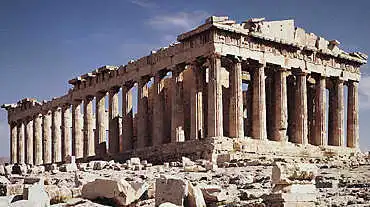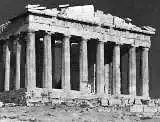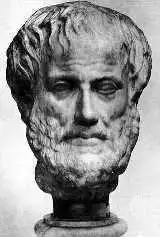Cosmos of the Ancients The Greek Philosophers on Myth and CosmologyLeucippus egarding Leucippus (flourished c. 430 BC) it is reasonable to do as Aristotle did in his writing, pairing him with his student Democritus. Almost nothing is known about his own life. He is said to have written only one book, The Great World-Order, the title implying that it would suffice. Yet, a remaining quotation is from a text entitled On Mind, which may be a chapter of it or another book of his: "Nothing happens at random; everything happens out of reason and by necessity."
egarding Leucippus (flourished c. 430 BC) it is reasonable to do as Aristotle did in his writing, pairing him with his student Democritus. Almost nothing is known about his own life. He is said to have written only one book, The Great World-Order, the title implying that it would suffice. Yet, a remaining quotation is from a text entitled On Mind, which may be a chapter of it or another book of his: "Nothing happens at random; everything happens out of reason and by necessity."
Leucippus and Democritus have the essence of their cosmology in common, some basic terminology of it probably invented by the former, though the latter is by far the most famous of the two, and more well-documented. Diogenes Laertius says that Leucippus was the student of Zeno, and that he stated about the world: The sum of things is unlimited, and they all change into one another. The all includes the empty as well as the full. The worlds are formed when atoms fall into the void and are entangled with one another; and from their motion as they increase in bulk arises the substance of the stars. The atom, the particle so small it cannot be divided, was a concept further developed by his student Democritus, but already with Leucippus, if Diogenes is to be trusted, much of this cosmology was formed. This is also how Aristotle treats the two — as of one opinion in cosmological matters. The unlimited all, according to Leucippus, is made up of part full and part empty, and to him those are the real elements — full being the atoms and empty being the space between them. Out of this mixture numerous worlds arise, and eventually dissolve. This happens through a vortex taking place when atoms enter the void, and thereby atoms alike join, arranging themselves according to their "shape, order and position" into a spherical system. Out of this, the earth — being drum-shaped — is formed. In line with the dynamics of the world as a whole, also for any entity within it, birth is a joining and death is dissolving. Also the soul, says Aristotle on Leucippus and his disciple, is made of atoms, rounded in shape, since such forms are the most freely movable, and the soul is what brings movement to the living creatures: the spherical atoms are identified with soul because atoms of that shape are most adapted to permeate everywhere, and to set all the others moving by being themselves in movement. This implies the view that soul is identical with what produces movement in animals. That is why, further, they regard respiration as the characteristic mark of life. In the atomic cosmos of Leucippus there is neither room nor mission for any gods, to the extent that he not even would have needed to deny their existence. They are so far away from his great world-order, that they might as well belong to a completely different world, or for that matter, exist in the world of Leucippus, but isolated from the natural processes taking place in it.
LiteratureFreeman, Kathleen, Ancilla to The Pre-Socratic Philosophers, Oxford 1952.Diogenes Laertius, Lives of Eminent Philosophers, translated by R. D. Hicks, volume II, Loeb, London 1950. Aristotle, Metaphysics, 985b, translated by Hugh Lawson-Tancred, London 1998. Aristotle, On the Soul, 1.2, translated by J. A. Smith, WWW classics.mit.edu.
© Stefan Stenudd 2000

The Greek Philosophers
AristotleIntroductionAristotle's LifeTimelineAristotle's PoeticsAristotle's CosmologyAbout CookiesMy Other WebsitesCREATION MYTHSMyths in general and myths of creation in particular.
TAOISMThe wisdom of Taoism and the Tao Te Ching, its ancient source.
LIFE ENERGYAn encyclopedia of life energy concepts around the world.
QI ENERGY EXERCISESQi (also spelled chi or ki) explained, with exercises to increase it.
I CHINGThe ancient Chinese system of divination and free online reading.
TAROTTarot card meanings in divination and a free online spread.
ASTROLOGYThe complete horoscope chart and how to read it.
MY AMAZON PAGE
MY YOUTUBE AIKIDO
MY YOUTUBE ART
MY FACEBOOK
MY INSTAGRAM
MY TWITTER
STENUDD PÅ SVENSKA
|
 Cosmos of the Ancients
Cosmos of the Ancients